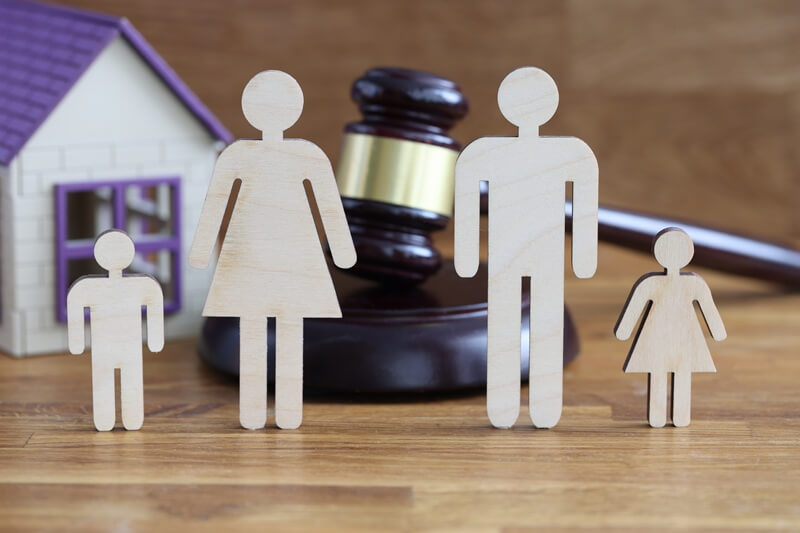Difference Between Legal Separation & Divorce In Virginia
Difference Between Legal Separation & Divorce In Virginia
When facing marital challenges, many couples in Virginia consider two legal paths: legal separation or divorce. The decision between the two holds significant emotional and legal weight. Understanding these options is essential because they lead to very different outcomes. A legal separation allows couples to live apart while remaining married, whereas a divorce legally dissolves the marriage.
Both choices come with their own emotional, legal, and financial implications. Virginia’s legal system has specific rules for each process, so it’s essential to understand what makes these paths distinct.
This article covers the key distinctions, pros and cons, and factors to consider when choosing between these two.

Understanding Legal Separation In Virginia
In Virginia, legal separation isn’t formally recognized, but couples may pursue a legal arrangement known as “separate maintenance”. This allows couples to live apart while maintaining certain legal responsibilities, such as spousal support and child custody agreements. Separate maintenance addresses financial matters without ending the marriage, which can be useful for those not ready to pursue a divorce.
Though Virginia doesn’t issue a formal legal separation status, it recognizes that spouses may want to live separately while retaining specific rights and obligations. For example, a spouse may still be entitled to health insurance benefits or inherit property during a legal separation. In divorce, it’s different where these rights often end.
This option can be particularly helpful when one or both spouses hope for reconciliation. Legal separation provides time to work through issues without the permanence of divorce. It can also be beneficial for couples who, due to religious or personal beliefs, prefer not to end their marriage legally.
For some, a legal separation may be a temporary arrangement. For others, it could be a long-term solution. Couples can choose this route to address immediate concerns like child custody, child support, and spousal support while remaining legally married.
With a basic understanding of legal separation, it’s time to understand what is involved in divorce.
Divorce In Arlington, Virginia
Divorce in Virginia, unlike legal separation, is the legal termination of a marriage. Once the divorce decree is finalized, the marital relationship is legally over.
In Virginia, there are two types of divorce: fault-based and no-fault. A no-fault divorce occurs when a couple has lived separately for at least one year (or six months with a separation agreement and no children). Fault-based divorces may be granted for reasons like adultery, cruelty, or desertion.
One critical requirement for filing for divorce is residency. At least one spouse must have lived in the state for at least six months before initiating the process. This ensures that Virginia courts have jurisdiction over the divorce case.
Once divorce proceedings begin, several important issues are addressed, including the division of marital property, spousal support (alimony), child custody, child support, and visitation rights. Virginia follows an equitable distribution approach, meaning that marital assets are divided fairly, though not necessarily equally.
Divorce offers a final resolution to marital disputes, allowing each spouse to move forward independently. However, it also means giving up certain benefits, such as health insurance, through a spouse’s employer.
Next, learn about the key differences between legal separation and divorce.
Key Differences Between Legal Separation & Divorce
At the heart of the difference between legal separation and divorce is the finality. Legal separation allows couples to remain legally married, while divorce ends the marriage entirely. This has profound implications for everything from financial arrangements to health benefits.
For example, a legally separated spouse may remain covered under the other spouse’s health insurance plan, but this typically ends once a divorce is finalized.
In terms of financial implications, both legal separation and divorce require decisions about asset division, spousal support, and child support. However, legal separation may result in temporary arrangements, which can be adjusted if the couple reconciles or eventually divorces.
Divorce, on the other hand, makes these decisions permanent. The court will issue final orders regarding the division of marital property, child custody, and support.
A key advantage of legal separation is the possibility of reconciliation. If a couple reconciles, they can resume their marriage without the need to remarry. Divorce, by contrast, is final. Once a divorce decree is issued, the couple would need to remarry to become legally united again.
Another important consideration is how each option affects benefits. In legal separation, spouses may continue to share certain benefits, such as health insurance or pensions. Divorce typically ends these shared benefits, as the legal bond between the spouses is severed.
Having explored the differences, now you’re ready to dive into the pros and cons of legal separation.
Pros & Cons Of Legal Separation
Legal separation offers couples several advantages. First, it allows them to remain legally married while living apart. This can be an ideal option for those who want to take time to reflect on their relationship or work toward reconciliation. Legal separation can also help maintain certain financial benefits, such as shared health insurance and tax advantages, that would end with divorce.
Another key benefit is that legal separation provides a buffer period for couples to sort out their feelings and consider the long-term implications of divorce. It’s an option that many couples choose when they aren’t emotionally ready to end their marriage but need space to figure out the next steps.
However, legal separation can be just as emotionally taxing as divorce. Couples must still address important issues like child custody, spousal support, and property division. The emotional strain of negotiating these terms can feel just as significant as in a divorce.
One downside of legal separation is the ambiguity it can create. Without the finality of divorce, there can be uncertainty about the relationship’s future. Couples may remain in a state of limbo, unsure whether they are working toward reconciliation or eventually moving toward divorce. For some, this uncertainty can be frustrating and emotionally exhausting.
Now that you’ve looked at legal separation, you can turn to the pros and cons of divorce.
Pros & Cons Of Divorce
Divorce offers a clear and definitive end to a marriage. One of its main advantages is that it provides legal closure, allowing both parties to move on with their lives independently. The divorce decree outlines all the necessary arrangements, including the division of assets, child custody, child support, and alimony, making the process final.
Another benefit of divorce is the ability to remarry. Once the divorce is finalized, both parties are free to marry someone else. Divorce also establishes a clean break, meaning neither spouse is tied to the other legally or financially beyond what the court orders.
However, divorce can be emotionally and financially taxing. The process can be lengthy, especially in contested divorces where the spouses cannot agree on key issues. Legal fees, court filings, and potential mediation costs can add up, creating a financial strain on both parties.
Emotionally, divorce is often difficult because it marks the permanent dissolution of a once-committed relationship. Even in cases of uncontested divorce, feelings of loss, anger, or grief are common. The emotional toll can extend beyond the couple, affecting children, extended family, and social circles.
While divorce provides finality, it comes at a cost. Legal separation may offer a temporary alternative for those unsure about permanently ending their marriage.
However, if the goal is a clean break and moving forward independently, divorce may be the better option. Next are the key factors to consider when choosing between legal separation and divorce.
Factors To Consider When Choosing
The first is emotional readiness. Divorce or legal separation is a major life decision that must be carefully considered. Are both parties emotionally prepared for the challenges of living apart, whether temporarily or permanently? Often, couples who pursue legal separation need time to process their emotions before committing to divorce.
Financial circumstances also play a significant role. Divorce often leads to a division of assets, including property, bank accounts, and retirement funds. Legal separation may allow couples to keep some of these financial benefits intact.
For example, health insurance coverage can continue under legal separation, which is not usually the case after divorce. It’s crucial to consider how each option will affect your long-term financial stability.
Parental responsibilities are another critical consideration. Child custody and support arrangements can look different in legal separation versus divorce. In a legal separation, temporary custody arrangements may be made, whereas in divorce, custody decisions are final. The well-being of children should always be the top priority when making these decisions, and a well-thought-out parenting plan is essential.
For some couples, religious or moral beliefs may also guide the decision. Certain faiths or personal values may discourage divorce, making legal separation a more appealing option. Legal separation allows couples to live apart while still honoring their religious or moral beliefs.
Finally, long-term goals must be evaluated. Are you considering reconciliation, or is the relationship truly over? Legal separation allows for potential reconciliation, whereas divorce permanently closes that door. Couples must be honest about their intentions when choosing the best path forward.
If you’ve made up your mind about which one to pursue, here’s the outline of the legal process.
How The Irving Law Firm Can Help

The Irving Law Firm is here to guide you through your family law needs. Whether you’re considering legal separation or divorce, we provide clear and compassionate legal advice every step of the way. Our experienced Arlington VA divorce attorneys have handled various cases, such as contested divorces and child custody disputes. We’re committed to helping our clients achieve the best possible outcomes.
Our team understands that every family’s situation is unique, and we approach each case with personalized care. If you need an Arlington VA divorce lawyer who truly understands your needs and concerns, The Irving Law Firm is ready to help. With our team by your side, you can trust that your case will be handled with care and professionalism.
Summary
In summary, legal separation and divorce offer different paths for couples in Virginia. While legal separation allows couples to remain married and work through their issues, divorce offers an end to the relationship. Both options have emotional, financial, and legal implications that must be carefully weighed before deciding which path is best for you.
It’s essential to consult with an attorney for divorce in Arlington to fully understand each option’s legal and personal consequences. A knowledgeable Arlington divorce attorney can help guide you through the process, providing the support you need to make informed decisions.
Whether you are considering separation or divorce, The Irving Law Firm is here to assist you in exploring your legal options. Reach out today to learn more.




